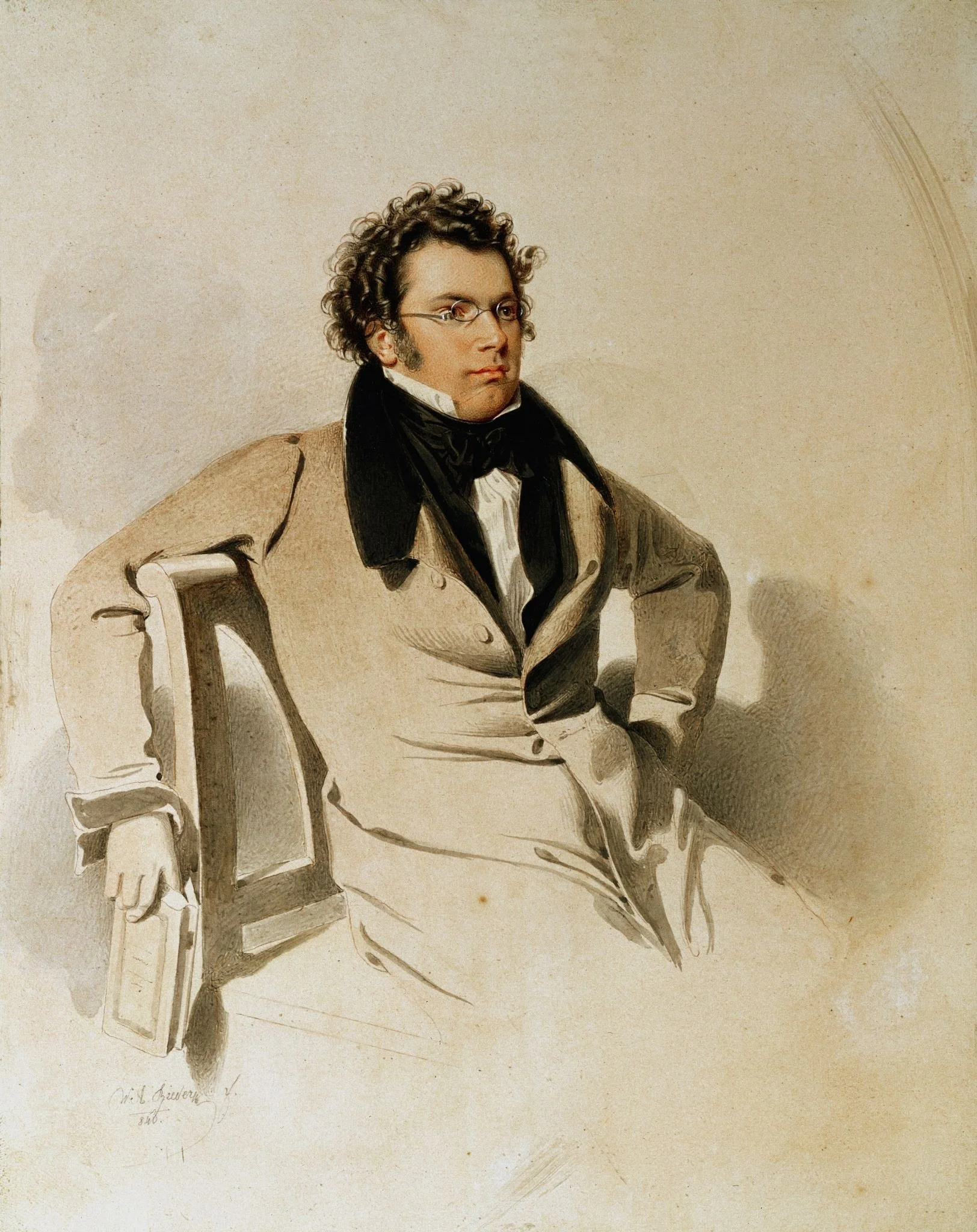Thank you for being a part of One Found Sound’s eleventh season!
You make each performance so incredible and unique, and we are thrilled to share some amazing music with you tonight.
• • •
Velocity features immersive lighting and visuals by Max Savage in collaboration with Karen Hu.
Photosensitivity warning: this show might not be safe for some people with epilepsy. Some lighting used at this show may be disruptive to people who are sensitive to light. For more information about photosensitivity please visit leaddiy.org
program
Hannah Kendall (b.1984)
Vera (2008)
• • •
Angélica Negrón (b. 1981)
bubblegum grass / peppermint field (2011)
• • •
Franz Schubert (1797-1828)
Octet in F major, D. 803 (1824)
I. Adagio – Allegro – Più allegro
II. Adagio
III. Allegro vivace – Trio – Allegro vivace
IV. Andante – variations. Un poco più mosso – Più lento
V. Menuetto. Allegretto – Trio – Menuetto – Coda
VI. Andante molto – Allegro – Andante molto – Allegro molto
land acknowledgement
One Found Sound respectfully acknowledges that the land on which we are gathered for this performance, and on which we have gathered for our rehearsals, is located on the unceded ancestral homeland of the Ramaytush Ohlone peoples—specifically the Yelamu—an independent tribe of the Ramaytush Ohlone that once inhabited what is now known as San Francisco County.
We share our acknowledgement with you to pay our respects to the ancestors, elders, descendants, and relatives of the Ramaytush Ohlone peoples; to affirm and promote consciousness of the cultural and sovereign rights of First Peoples; as a step in our continuing efforts to recognize the ongoing atrocities and brutalities of colonialism; and as a step in understanding our place in the process of decolonization and reconciliation as individuals, as artists, as an orchestra, and as a community.
We recognize that the Ramaytush Ohlone Peoples, as the original stewards of this land, understood the interconnectedness of all things and maintained harmony with nature for millennia, and we honor them for their enduring commitment to Mother Earth.
———
Visit the Association of Ramaytush Ohlone online at ramaytush.org
one found sound
violin
Michelle Maruyama
Caitlin McSherry
viola
Samuel Nelson
cello
James Jaffe
bass
Michael Minor
clarinet
Sarah Bonomo
bassoon
Jamael Smith
horn
Caitlyn Smith Franklin
Hannah Kendall (b.1984)
Vera (2008)
Programme Note
The melodic and harmonic material in this piece was generated through a 12‐tone row. In the first instance, the ‘white notes’ (as on the piano) were removed from the series in order and the opening playful section is based on these notes only. These pitches, but in retrograde, also form the basis of the clarinet line when it first enters.
The remaining notes of the prime row are introduced for the first time in the following ‘still’ section and as these pitches inflect the harmony in‐turn, a much heavier and darker effect is created. Each instrument is then given a solo before coming back together for a calmer replay of the opening.
Hannah Kendall | January 2008
Hannah Kendall
Known for her attentive arrangements and immersive world-building, Hannah Kendall’s music looks beyond the boundaries of composition. Her work bridges gaps between different musical cultures, both honouring and questioning the contemporary tradition while telling new stories through it. Contrasting fine detail with limitless abandon, she has become renowned both as a composer and a storyteller, confronting our collective history with narratively-driven pieces centred on bold mission statements.
Marked by striking and often polarising dynamics, her large-scale work simmers on the surface, and is upturned by the briefest moments of bombast. Ensemble pieces subvert audience expectations of ‘quiet and loud’, ‘still and moving’; scattering those musical opposites unexpectedly. The sounds are visceral, but their placement is complicated, disclosing the detail that exists beneath. While hinging on intense moments, Kendall’s music is also staggeringly intricate, manoeuvring tiny decisions that reveal themselves on further listens.
Kendall’s recent work has provided a meeting point for different types of music, carrying with it the weight of connected but unharmonised histories. Recently, she’s achieved this by looking beyond the typical tools of composition, using auxiliary instruments that exist outside of the concert hall. In Tuxedo: Vasco ‘de’ Gama, she integrated the spiritual Wade in the Water, transcribing its melody into a delicate music box, contrasting the fragility of the instrument against the song’s resounding place in history. Tuxedo: Hot Summer No Water (2020) for solo cello features an ACME Metropolitan whistle, placing a sonic timestamp on the piece; pointing to a year significantly defined by the police’s presence in black communities.
Her Tuxedo series is named after an artwork by American artist Jean-Michel Basquiat. His eponymous piece provides one of many graphic scores that Kendall has used as inspiration throughout her career. Rather than create ‘representations’ of these images, she uses them to spark her writing process. Building pieces from a place of intuition, her compositions are just as likely to be become abstracted, turned inside out by surprises she finds along the way, as they are to have a firm narrative.
Kendall’s work has been widely celebrated. She has created pieces such as Disillusioned Dreamer (2018), which the San Francisco Chronicle praised for having a ‘rich inner life’, as well as The Knife of Dawn (2016), a chamber opera that received critical acclaim for its involving and claustrophobic representation of the incarceration of Guyanese political activist Martin Carter. Her work has been performed extensively, and across many platforms. She has worked with ensembles including London Symphony Orchestra, BBC Symphony Orchestra, Boston Symphony Orchestra, LA Philharmonic, New York Philharmonic, Seattle Symphony Orchestra, The Hallé, Ensemble Modern, and London Sinfonietta, but you’ll also find her collaborating with choreographers, poets and art galleries; crossing over to different art-forms, and celebrating the impact these unique settings have on sound. In 2022, she was the recipient of the Hindemith Prize for music composition, and nominated for an Ivor Novello Award in the Small Chamber category.
Born in London in 1984, Kendall is currently a Doctoral Fellow in composition at Columbia University. Her music is published by Ricordi (Berlin).
Angélica Negrón (b. 1981)
bubblegum grass / peppermint field (2011)
Program Notes
A lot of my music is about the desire of being in a different time and place than the one I'm currently in. For "bubblegum grass/ peppermint field", I was inspired by the idea of daydreaming and escaping to my own personal made up land. This piece was originally written for an electronic gamelan ensemble designed and developed by Alex Rigopulos, which is modeled after a Balinese Gong Kebyar, with ten players performing the electronic gamelan instruments along with a string quartet. The electronics consist of acoustic samples of found objects in my apartment and also micro-samples from some of my previous pieces reflecting my interest in capturing and retaining different moments in time through my music.
Angelica Negrón
Puerto Rican-born composer and multi-instrumentalist Angélica Negrón writes music for accordions, robotic instruments, toys, and electronics as well as for chamber ensembles, orchestras, choir, and film. Her music has been described as “wistfully idiosyncratic and contemplative” (WQXR/Q2) while The New York Times noted her “capacity to surprise.” Negrón has been commissioned by the Bang on a Can All-Stars, Kronos Quartet, loadbang, MATA Festival, Brooklyn Youth Chorus, Sō Percussion, the American Composers Orchestra, and the New York Botanical Garden, among others. She has composed numerous film scores, including Landfall (2020) and Memories of a Penitent Heart (2016), in collaboration with filmmaker Cecilia Aldarondo. She was the recipient of the 2022 Hermitage Greenfield Prize. Upcoming premieres include works for the Seattle Symphony, LA Philharmonic, NY Philharmonic Project 19 initiative and multiple performances at Big Ears Festival 2022. Negrón continues to perform and compose for film.
Learn more about Angélica here
Franz Schubert (1685-1750)
Octet in F major, D. 803 (1824)
I. Adagio — Alegro — Più allegro
II. Adagio
III. Allegro vivace — Trio — Allegro vivace
IV. Andante — variations. Un poco più mosso — Più lento
V. Menuetto. Allegretto — Trio — Menuetto — Coda
VI. Andante molto — Allegro — Andante molto — Allegro molto
Franz Schubert
In his very brief lifetime, Austrian composer Franz Schubert (1797-1828) managed to write an incredible amount of music, including symphonies, operas, chamber works, and over 600 songs. From a young age Schubert showed intense proclivity for his craft, as a boy he studied piano and violin with his father and brother, and as a teen he studied theory and composition with *the* Antonio Salieri. The young Schubert hosted rollicking evenings of performing and imbibing, which became known as Schubertiades (and still happen today!), and he later served as a torchbearer at Ludwig Van Beethoven's funeral--just one year before his own death.
Schubert's Octet in F major was commissioned by Count Ferdinand Troyer, a wealthy noble who happened to be an amateur clarinetist (good news, wind players!). Written in the early months of 1824, Schubert modeled his Octet after Beethoven's Septet in E flat major, a wildly popular work composed some 25 years earlier. (In his lifetime, Beethoven was continually peeved that his Septet was one of his most famous works, exceeding the popularity of most of his other compositions).
Though it may have been written 199 years ago, Schubert's Octet is no less thrilling, sentimental, and totally awesome than it was back in the day.
Program note by Georgeanne Banker
thank you for being a part of our orchestra!
From artist compensation to concert production costs, your support helps our orchestra thrive. All proceeds from tonight’s event will support our 2023 – 2024 season, helping us bring classical music to wider audiences in our community through unique concert experiences. Thank you for making your tax-deductible contribution at our performance tonight, or by clicking the link below.
Become a Onesie! Chat with us at the Onesie table near the patio door tonight, or visit us online to learn more about the perks of joining our exciting Onesie patron program.
See you at our next show! Click below to get your tickets 🎟
Thank you to our Onesies!
Crystal
$10,000 annually or $2,500 quarterly
Anonymous
James F. Bonomo, Gabriella Bonomo, Adam Bonomo, Kitty
Ruby
$5,000 annually or $1,250 quarterly
Rick Launer and Amy Sadoff
Connie Zweigle
Emerald
$2,500 annually or $625 quarterly
Anonymous (3)
Jeff Padden
Mark Slee & Chloé Blain
Brad Taylor
Diamond
$1,000 annually or $250 quarterly
Anonymous
Gerard Buulong & Fred Silverman
Crane Data Centers
Beau Davenport
Linda Dembo and Stephen Smoliar
Erik Goldman
Dean Gooch
Brien Henderson
Zack Launer
Peter Nelson
Kiran & Leela Richards
Marco Rozzano
Andrew Watterson and Keith Kurson
Velvet
$500 annually or $125 quarterly
Anonymous (4)
Alessandra Aquilanti & Josh Walden
Elizabeth Arai
Bill & Shirley Banker
Ann & Scott Botel-Barnard
Frank Daffin & Amy Barrett-Daffin
Samantha Goldstein
Riccardo Guidi
Melissa G. Hernandez
Nicola Shangrow Reilly
Christopher Slee
Tom and Karen Tsueipauer
Sparkle
$200 annually or $50 quarterly
Antoinette Barrett
Hilary Beech
Martin & Kathleen Cohn
Sherri Cornett & Steve Kriner
E and J
Jon Gooblar
Phil & Valerie Heller
J.D. Hogan
Curt Holzinger
Steven Horwitz
Donna & Mike Kaplan
Cynthia Launer & Will Thomas
Carol Lewis
Helise Mack
Ken Marson
Sejal Patel
Kala Perkins
Utthara R.
Dr. Susan Raeburn
Lou Scott
Michel Taddei
Paul Van Cleave
Thank you to our sponsors!
Heron Arts
Hogan Lovells
Lagunitas Brewing Company
Google for Nonprofits
AmazonSmile
Grants for the Arts
The Fleishhacker Foundation





